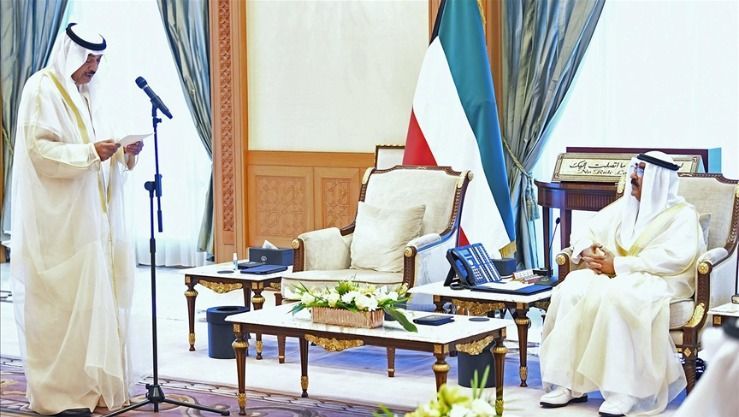Kuwait Appoints New Crown Prince Amid Political Shift
In a historic succession, Sheikh Sabah Khaled Al-Hamad Al-Sabah steps into his role as Kuwait's new Crown Prince, marking a pivotal turn in the Gulf State's political landscape.
Published June 03, 2024 - 00:06am

Image recovered from elbilad.net
The State of Kuwait recently witnessed a significant political development with the appointment of the new Crown Prince, Sheikh Sabah Khaled Al-Hamad Al-Sabah. Official sources confirm that the swearing-in ceremony took place, cementing his position as the deputy to the Emir, Sheikh Mishal Al-Ahmad Al-Jaber Al-Sabah.
Sheikh Sabah, born on March 15, 1953, previously served as Prime Minister from November 19, 2019, until July 24, 2022. With extensive experience in public service and diplomacy, he is regarded as a seasoned politician well-versed in the intricacies of Kuwaiti and international politics.
Amid recent political tensions, the Emir of Kuwait dissolved the parliament and suspended certain constitutional articles, a temporary measure purportedly aimed at reviewing and safeguarding the country's democratic process. This backdrop of political reform and recalibration in Kuwait led to the formal endorsement of Sheikh Sabah by the Cabinet to take on the mantle of Crown Prince.
Kuwait's political arena has been the subject of global interest, especially following the decision to suspend the legislature. The country's leadership insists that such measures were necessary to preserve national interests and stave off interference with the sovereign functions of state, including the selection of governmental ministers and the Crown Prince himself.
As the new executive government took its oath last month, the nation and its stakeholders are closely monitoring these developments. This governmental reorganization signifies a new chapter for Kuwait, embodying both continuity and change within the ruling establishment.
The elevation of Sheikh Sabah to the role of Crown Prince is more than a mere transition of power; it comes at a time when Kuwait embarks on a path of political fine-tuning. The ceremony underlined the Kingdom's commitment to its monarchical traditions and heralded a future where old wisdom and contemporary vision coexist. In a realm where loyalty to the Crown and adherence to the constitution go hand in hand, the citizens of Kuwait are looking to this new appointment to lead the way forward.
Sheikh Sabah Khaled Al-Hamad Al-Sabah's appointment is of considerable significance as the nation navigates through uncharted waters of regional politics and economic challenges. With the global oil market's instability and the pressing need for economic diversification, Kuwait is at a pivotal juncture that demands innovative governance and strategic fortitude. The Crown Prince's executive experience is expected to play a crucial role in driving forward the national agenda for economic reform and modernization.
Furthermore, the recent political disruptions highlight a clear intention within Kuwaiti leadership to recalibrate the governance structure. This recalibration is seen by many as an attempt to restore the balance between maintaining an effective governance system and ensuring that the rights and liberties of the Kuwaiti populace are preserved. The Crown prince's ascendancy, thus, signals a potential shift in policy formulation and socio-political strategy aimed at fostering long-term stability and growth.
The Kuwaiti Cabinet, having endorsed Sheikh Sabah, reflects a collective vision to strengthen the political stability of the nation. It also intends to emphasize a more collaborative approach between the different powers of the state. By reorganizing the government structure, Kuwait is expressing its ambitions to reform the bureaucratic processes and enhance the efficacy and transparency of the administration. This government reorganization has been cautiously observed by international onlookers, who recognize the strategic importance of Kuwait in the Gulf region and its significant role in the global energy market.
Moreover, Sheikh Sabah's diplomatic credentials are expected to be invaluable in maintaining and strengthening Kuwait's foreign relations. The geopolitics of the Middle East, fraught with sectarian tension and in the wake of recent global events, demands skilled negotiation and strategic partnerships. As a long-standing member of Kuwait's foreign service and with his prior role as Primer Minister, the Crown Prince is no stranger to the delicate balance of fostering good relations while protecting national interests.
In line with these new developments, questions about electoral processes and legislative reforms have come to the forefront. The dissolution of the parliament, though a cause for contemplation, has been defended by the leadership as a step towards enhancing the nation's parliamentary practices. Observers anticipate that the forthcoming electoral cycle will be a test of the Crown Prince's aptitude for embracing the constitutional mandate and ushering in electoral reforms that can revitalize the Kuwaiti political landscape.
As Sheikh Sabah Khaled Al-Hamad Al-Sabah takes on the responsibilities of Crown Prince of Kuwait, the expectations on his shoulders are undoubtedly high. Whether addressing internal reforms or navigating international politics, his vision for Kuwait's future will be instrumental in shaping the course of its development. With the nation's eyes firmly set upon him, the Crown Prince's decisions in the coming era will be pivotal in reinforcing Kuwait's standing on both the regional and the world stage.
The trajectory Kuwait is set to embark upon holds promise for a more engaged and dynamic governance model that can adapt to the demands of the 21st century while respecting the traditional values that have long defined its society. As the new Crown Prince settles into his role, the world watches with keen interest to see how Kuwait will balance tradition with the necessity for innovation in an ever-changing global landscape.







